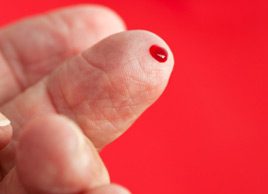Blood glucose readings: What they mean
Keeping track of blood sugar levels with a blood glucose meter is an important component in managing diabetes. But what do the numbers mean?

Source: Web exclusive: June 2011
When you have diabetes, perhaps the most important thing you need to know is the level of your blood glucose, also known as your blood sugar. Since many factors can raise or lower your blood glucose, you may have to check it several times a day. But once you obtain a blood glucose reading, what exactly does it mean?
Crunch those numbers
When you test a drop of your blood with a glucose meter, the big number that pops onto the screen refers to the number of millimoles (mmol) of glucose per litre (L) of your blood. A millimole (mmol) is one-thousandth of a mole, which is a standard unit for measuring the mass of molecules.
And if that’s not already confusing enough, the United States uses a completely different system than Canadians for measuring blood glucose. South of the border, blood glucose is measured in milligrams per decilitre (mg/dL). This can sometimes be rather bewildering, especially if you’re brand new to diabetes and researching your disease on the Internet. “I tell people to go to a Canadian site first,” says Tabitha Palmer, a certified diabetes educator at the Centre for Clinical Research in Halifax.
Know your targets
So what numbers should you be looking for? Your target reading before meals should be between 4 and 7. Your blood sugar normally spikes two hours after a meal, so between 5 and 10 is a good range after you eat. Besides food, other factors that can cause your blood sugar to go up or down include exercise, illness, medications and stress.
Your blood glucose readings are hands-down the best way to monitor whether or not your diabetes is generally well managed. "They really help the physicians and educators if we’re trying to look at whether you need to have your medication, insulin or mealtime adjusted," says Palmer.
Don’t let your blood sugar numbers get to you
It’s normal to feel frustrated, puzzled or even down in the dumps once you read the number on that screen. But remember, the reading is there to help you adjust your lifestyle, meals, medication or insulin. It’s not a mark of failure if you don’t see the number you’re hoping for.
Stop in at the lab
About every three months you should take a different kind of glucose reading, called an A1C test. This laboratory test checks how much glucose has become "stuck" to your red blood cells over their three-month lifetime. It’s a way for you and your doctor to get a bigger-picture view of how your blood glucose levels are doing overall.
The A1C can be more helpful than averaging all of your blood glucose readings for the same period, says Palmer. "The average could look really healthy, but it could actually be taken from a combination of very, very high and very, very low readings." The A1C will show evidence of those blood sugar spikes.
Deal with blood glucose highs and lows
What if your glucose readings are high? This can happen when your diabetes medicine is insufficient. It can also happen when you eat too much, don’t exercise enough, or are sick or stressed. You may not know your sugar is high. But since that’s what can cause health complications over time, the glucose reading is an important guide.
On the other hand, your glucose readings can be low if you’re taking more diabetes medicine than you need. They can also be low if you’re eating off-schedule or less than normal, or if you drink alcohol.
Your glucose readings are more likely to be low when your diabetes is well managed. Keep up the good work, but do treat low readings right away by having 10 to 15 grams of carbohydrate, like fruit juice or glucose tablets.
Over time, you may be tempted to take fewer blood glucose readings. But remember, these readings are the only way to know for sure how your blood glucose is doing. "Your sugars can be high and you can feel just fine. And if you have repeated lows, over time you can lose sensitivity to them," Palmer says. "So if there’s no testing, your sugars can be out of whack."
Need help and support managing your diabetes? Like our Facebook page for regular updates, tips and recipes.




